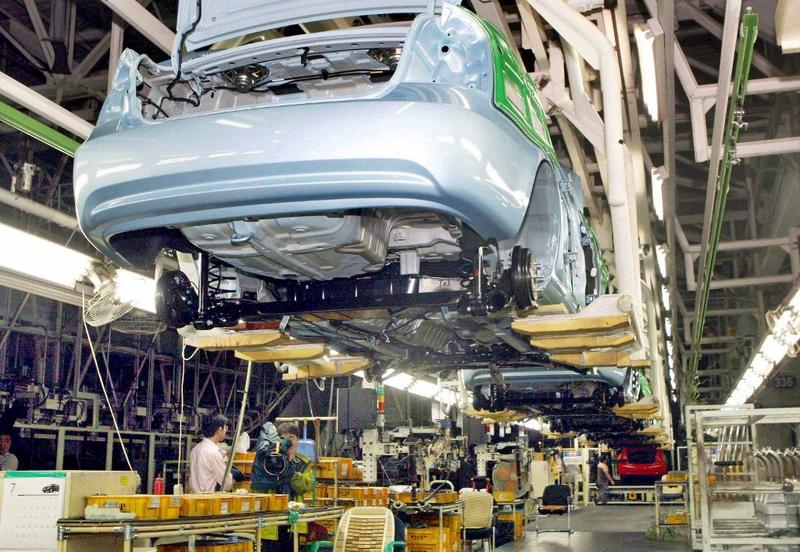 Assembly lines stand idle at South Korea's Hyundai Motors plant in Ulsan, south of Seoul on July 2, 2008. (CHOI JAE-HO / AFP)
Assembly lines stand idle at South Korea's Hyundai Motors plant in Ulsan, south of Seoul on July 2, 2008. (CHOI JAE-HO / AFP)
SEOUL / ULSAN - Defiant South Korean truckers embarked on broader and more aggressive strike action on Friday, threatening to severely curtail deliveries of raw materials for semiconductors and petrochemical products.
Entering its fourth day, the strike protesting soaring fuel costs halved production at Hyundai Motor Co's biggest factory complex on Thursday and has disrupted shipments for a range of companies including steelmaking giant POSCO.
Container traffic at ports has also slowed sharply. At Busan port, which accounts for 80 percent of the country's container activity, traffic was down to a third of normal levels on Friday, a government official said.
At Incheon port, it has fallen to 20 percent of normal levels while at the port for Ulsan, the industrial hub where much of the strike action has occurred, container traffic has been completely suspended since Tuesday.
About 7,500 members, or about 35 percent of the Cargo Truckers Solidarity union in the country, are expected to go on strike on Friday, according to South Korea's transport ministry. The government estimates that about 6 percent of the country's 420,000 truck drivers belong to a union.
The union has contended that the numbers on strike are much higher than government estimates and that many non-union truckers are also refusing to work.
The strike led to a halving of production at Hyundai Motor's biggest factory complex in the industrial hub of Ulsan on Thursday. Some 1,000 truckers were protesting in front of the complex on Friday, a Reuters witness said.
"There are some disruptions to our production due to the truckers strike, and we hope production would be normalized as soon as possible," a Hyundai spokesperson said.
The truckers plan to stop shipments of raw materials for semiconductors that are produced in Ulsan, Park Jeong-tae, a senior truckers union official, told Reuters on Friday
Hyundai normally makes about 6,000 vehicles a day at its plants in Ulsan, including the high-margin Genesis SUV and Ioniq 5 electric vehicle.
READ MORE: S. Korea's Yoon names security adviser, 5 senior secretaries
South Korea is a major supplier of semiconductors, smartphones, autos, battery and electronics goods and the latest industrial action further raises uncertainty over global supply chains.
The truckers plan to stop shipments of raw materials for semiconductors that are produced in Ulsan, Park Jeong-tae, a senior truckers union official, told Reuters on Friday.
Samsung Electronics Co and SK Hynix, two of the world's biggest memory chip makers, declined to comment.
Park added that the number of vehicles entering an Ulsan petrochemical complex has been cut to one tenth of normal levels and truckers would be telling non-union truckers not to enter the complex.
South Korean President Yoon Suk-yeol, in power for just a month, said on Friday that the government planned to take a neutral stance in the dispute. He said that labor conflicts should be handled by law and principle.
That has alarmed some observers, who say Yoon's remarks could hinder the government's ability to come up with a solution.
"The government needs to review the union's demands. They don't need to accept them all, but I think they could make the situation a bit easier if they could consider giving out subsidies so truckers can deal with soaring fuel prices," said Shin Se-don, an economics professor at Sookmyung Women's University.
The union said a meeting with the government on Friday ended without an agreement and they would meet again on Saturday.
Police said around 30 union members have been arrested so far and it will respond strictly to illegal acts at strike sites.
ALSO READ: Samsung to invest $356b over five years in strategic sectors
Hyundai hindered
Share prices of major companies have been little affected on the view that the firms have sufficient inventories to ride out the strike for the time being.
Kim Gyeong-dong, a trucker union official, said the union ran out of funds to finance the strike on Thursday and that it was unlikely that the strike could last another 10 days.
Some companies were looking to make new contingency plans.
"If the strike continues next week, then we need to reassess our handling of shipments," said an official at a major South Korean electric vehicle battery maker, declining to be identified due to the sensitivity of the subject.
Outside factory and ports, union members were not physically blocking gates but would flag down approaching vehicles driven by non-union truckers, asking them not to proceed and cooperate with the strike. Police were present, however, and trucks wanting to be let through would not be stopped.
The truckers, regarded as self-employed contractors in South Korea, are seeking pay increases and a pledge that an emergency measure guaranteeing freight rates would be extended. The emergency measure was introduced during the pandemic and is due to expire in December.
The drivers also want freight rates to apply to a wider range of trucks, not just container trucks and cement trucks.
Shares of Hyundai Motor were up 0.6 percent as of 0332 GMT, versus the benchmark KOSPI's 1.2 percent fall.


